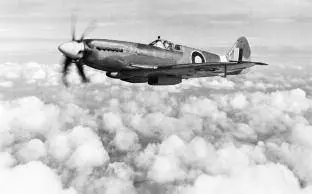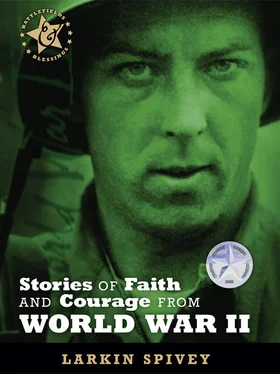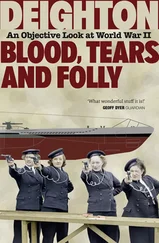Enter his gates with thanksgiving and his courts with praise; give thanks to him and praise his name. For the Lord is good and his love endures forever.
—Psalm 100:4–5
January 21
Trust Your Instruments
Hugh Godefroy was one of my great heroes: a Spitfire pilot during World War II. In 1940 he was an engineering student at Toronto University. He left school to volunteer for the Royal Canadian Air Force and to join the air battle in defense of England. Early in his training he encountered the difficulty of flying in clouds with no horizon or other outside reference points.
One day I spent doing nothing but cloud flying. We had to master the technique of fighting the vertigo which plagues pilots flying on instruments.
In the early days often I found myself sweating. I felt as though I were spinning in a spiral dive. One had to say to himself, ‘The instruments are right, and I am wrong.’ Finally I would break cloud, and find to my great relief that I was flying straight and level. We never worried in England at that time over what else might be flying in the same cloud. We never gave it a thought. 32In the early days of aviation, pilots had to fly “by the seat their pants.” There were no instruments to guide them. Now there are myriad devices that enable flight in darkness or clouds without visual references. Like most pilots I have experienced the overwhelming sensation while flying on instruments that the aircraft was doing something totally different from what the instruments were telling me. It became a struggle between my feelings and my knowledge of what was correct.
In our daily lives, our “instruments” are God’s words as revealed in the Bible. Sometimes biblical instructions are also counterintuitive. Jesus’ entire Sermon on the Mount is a departure from what then was considered ‘conventional’ wisdom. Even when our hearts attempt to steer us in the wrong direction, we must instead move in the direction God provides in his Word.
You have heard that it was said, “Love your neighbor and hate your enemy.” But I tell you: Love your enemies and pray for those who persecute you, that you may be sons of your Father in heaven.
—Matthew 5:43

British Spitfire fighter. (Imperial War Museum, E(MOS) 1348)

Children in London after bombing. (National Archives)
As a Spitfire pilot with combat experience, Hugh Godefroy took some pride in his lack of superstition. He summed up his own attitude: “I was not superstitious, and finding someone who was, had always made me want to prove them wrong.” One day he was preparing for a patrol over enemy territory. One of his fellow pilots pointed out that it was the 13 thof the month, also reminding him that he had been hit several times before on that day. In spite of his disdain for such thinking, he was suddenly struck with a mortal fear that he had never before experienced. For the entire mission he flew with a sense of dread. He unaccountably kept repeating the only prayer that he could remember: “Now I lay me down to sleep, I pray the Lord my soul to keep.”
When a group of enemy fighters attacked, he suddenly found himself flying and fighting for his life. He fatalistically resolved to sell himself dearly. Finally, grey with strain, nauseated, and out of ammunition, he sensed the end. With a Focke-Wulf 190 still on his tail, he turned for England, straightened out, and closed his eyes. After waiting for what seemed an eternity, he opened his eyes to see the enemy aircraft beside him, the other pilot looking over. After a few seconds the German broke off and headed back to France. Alone, on the ground, sitting in his cockpit, Hugh surveyed the holes in his damaged Spitfire and contemplated the folly of his own emotions. He resolved never again to let a superstitious reaction take over in the cockpit. 33
While in combat I have also fought off dark thoughts about my chances of surviving and of my “luck” running out. Unfortunately for me, I was a spiritual skeptic at that time and can attest to the fact that such thoughts can be overpowering without a strong faith in God and a sure knowledge of a place in his kingdom.
He will swallow up death forever. The Sovereign Lord will wipe away the tears from all faces; he will remove the disgrace of his people from all the earth.
—Isaiah 25:8
In September 1940 Kathleen Rainer was working in the fields near Ewhurst, Sussex, with her mother and brother. That day she observed an unforgettable incident in the sky above. As a dogfight between Allied and enemy fighters was raging overhead she saw a parachute appear. She realized it must be an Allied pilot when, to her horror, German fighters began to make passes, firing their machine guns at the helpless aviator. Then she saw an amazing sight:
We were so proud of our pilots for what they did next… the other Spitfires began to circle the parachute, protecting the pilot from the German attack. As the pilot descended down, the rest of his squadron would spiral down with him, guiding him to the ground and protecting him. We were so proud of them, risking their lives to save that one pilot who was otherwise totally defenceless against the German fighters. 34
A big part of Great Britain’s success during the Battle of Britain is attributed to the survival rate of her invaluable pilots. The great advantage of fighting over home soil was the fact that so many of these young men were able to make it safely back to base, even if their aircraft were lost. For this to happen, however, it took teamwork and a strong belief in the value of each pilot’s life. Again, we see how important it was then to have strong, close-knit units in the face of danger.
We need the same sense of urgency now in supporting and protecting each other within our own spiritual units of the body of Christ. The dangers may not be as obvious as those of actual combat, but the battle for our hearts and souls is just as real. We need each other—our brothers and sisters in Christ—if we hope to come through unscathed.
Speaking the truth in love, we will in all things grow up into him who is the Head, that is, Christ. From him the whole body, joined and held together by every supporting ligament, grows and builds itself up in love, as each part does its work.
—Ephesians 4:15–16
January 24
Thoughts of Death
Fighter pilots had to live with their own thoughts of death. Most, such as Squadron Leader Peter Townsend, were able to keep such thoughts at a distance:
Some of us would die within the next few days. That was inevitable. But you did not believe that it would be you. Death was always present, and we knew it for what it was. If we had to die, we would be alone, smashed to pieces, burnt alive, or drowned. Some strange, protecting veil kept the nightmare thought from our minds, as did the loss of our friends. Their disappearance struck us as less a solid blow than a dark shadow which chilled our hearts and passed on. 35
As a religious skeptic during wartime, my thought process was similar to this. In moments of panic, I prayed to God, even though I didn’t know him and didn’t really expect an answer. When the crisis of the moment was over, I never gave him credit for the result. During the lulls in action I fought off the same dark realizations expressed by this British pilot. A lonely death could come at any time. I had a good enough imagination to know that it could happen to me. Still, I tried not to dwell on that fact.
Читать дальше














